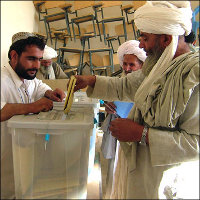Registration
You will receive an email confirming your registration.
The recent presidential and provincial council elections in Afghanistan came at a moment when coalition forces were assessing their strategy in the war against the Taliban. While President Obama has sent thousands of additional troops in recent months, the security situation continues to deteriorate in the face of Taliban advances.
On his return from a month-long trip to Afghanistan, Carnegie's Gilles Dorronsoro discussed the challenges facing both Afghanistan's leadership and the international community as they move forward with a post-election agenda. Dorronsoro outlined his key recommendations for an alternative stabilisation strategy for Afghanistan. The discussion was chaired by Fabrice Pothier, director of Carnegie Europe.
Highlights included...
- Gilles Dorronsoro candidly noted that the ‘clear, hold, re-build’ strategy pursued by the international forces is failing. Military operations in Helmand this summer did not succeed in deflecting the Taliban’s advances, despite the significant risks taken by U.S. and UK troops. Dorronsoro pointed out that unless immediate action is taken to change the strategic focus of the international coalition, the Taliban is going to win the war in Afghanistan.
- Dorronsoro commented on the recent presidential election and described the political bargaining strategy between Karzai and warlords and local power holders as dangerous for Afghanistan’s post-electoral development. Given the deteriorating security situation in large parts of Afghanistan, he doubted whether next year’s parliamentary election could actually be held.
- Dorronsoro outlined his proposal for an alternative stabilisation strategy, recommending that the international coalition concentrate its limited resources on securing the main cities and highly populated areas, as well as the most strategically important transportation routes. He also called for a more robust security strategy, which would respond to the Taliban’s incursions in the northern provinces, especially in Kunduz.
